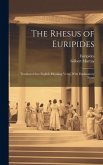This is a book about two things: medical instability and Renaissance drama. Medical stories are always also social stories, and William Kerwin presents five case studies of how the fragile and dynamic relationship between the medical and the nonmedical played out in Renaissance England. Renaissance drama richly staged that process, presenting medical practitioners in ways that undermined any attempt to imagine them as self-defining. Playwrights consistently unmasked fictions of medical autonomy, emphasizing that a variety of social narratives competed in the shaping of the medical culture. Drawing on research in the social history of medicine as well as a wide-ranging collection of primary narratives of medical encounters, Kerwin pursues the stories of several medical groups. Specifically, he examines women healers in terms of the changing place of women in the public sphere; the connections between drug sellers--apothecaries and alchemists--and an emerging modern economy; the role barbers and surgeons played in early modern concerns for protecting a new sense of privacy and interiority; the ways physicians defined their professional primacy through the language of theaters and actors; and the ways individual patients employed rhetorics of diagnosis as a way of participating in sectarian religious battles. The study moves from the dynamics of medical politics to the work drama does in exposing those dynamics. In addition to offering astute readings of works by Shakespeare and Ben Jonson, the book pays substantial attention to plays by Samuel Daniel, John Fletcher, John Ford, Thomas Heywood, John Lyly, Philip Massinger, and John Webster. Beyond the Body complements the wealth of recentcritical attention given to the body. Kerwin attends to a different sort of material politics; as the book's title suggests, he asks a reader interested in the politics of medicine to look not at the practitioner treating the body but at the social forces influencing the pra
Hinweis: Dieser Artikel kann nur an eine deutsche Lieferadresse ausgeliefert werden.
Hinweis: Dieser Artikel kann nur an eine deutsche Lieferadresse ausgeliefert werden.








